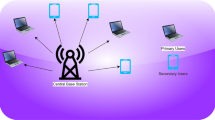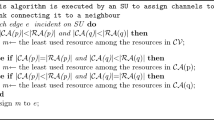Abstract
In Cognitive Radio (CR) networks, the non-cooperative behavior is an inherent security issue because it is necessary to realize many functions by means of cooperation, such as spectrum sensing. Then it is important to guarantee the support of cooperation between nodes on multicast communication. In this paper, first the multicast model with optimizing energy use is shown, in which consists of many multicast units. By considering the power consumption concerning spectrum sensing and data transmission, the multicast problem with optimizing energy use is translated into a 0-1 integer programming problem. Secondly, the trust values are calculated by the Bayesian theorem in CR networks. In order to improve the stability of trust mechanism, the new trust values are modified by the iterative control criterion. Finally, a secure minimum-energy multicast (SMEM) algorithm is proposed to ensure multicast communication, and the following example is shown to explain it. The simulation and analysis show that the time complexity of our proposed algorithm is polynomial. Moreover, with the increase of destination nodes, the SMEM algorithm is more effective than the distributed Dist-Implement models of adjustable transmission power in energy utilization.
Similar content being viewed by others
References
Raychaudhuri D., Jing X., Seskar I., Le K., Evans J. B. (2008) Cognitive radio technology: From distributed spectrum coordination to adaptive network collaboration. Pervasive and Mobile Computing 4(3): 278–302
Akyildiz I. F., Lee W. Y., Chowdhury K. R. (2009) CRAHNs: Cognitive radio ad hoc networks. Ad Hoc Networks 7(5): 810–836
Hu, D., Mao, S., & Reed, J. H. (2009, April). On video multicast in cognitive radio networks. In INFOCOM, Rio de Janeiro, Brazil.
Hu D., Mao S., Hou Y. T., Reed J. H. (2010) Scalable video multicast in cognitive radio networks. IEEE Journal on Selected Areas in Communications 28(3): 434–444
Wang, C., Tang, S., Li, X., & Jiang, C. (2009, October). Multicast capacity of multihop cognitive networks. In Proceedings of the 6th international conference on mobile adhoc and sensor systems (MASS), Macau, China.
Sankareswary, P., Suganthi, R., & Sumathi, G. (2010, January). Impact of selfish nodes in multicast ad hoc on demand distance vector protocol. In ICWCSC, Chennai, India.
Jun, S., Ahamad, M., & Xu, J. (2005, June). Robust information dissemination in uncooperative environment. In Proceedings of the 25th IEEE international conference on distributed computing systems, Columbus, OH, USA.
Ren, W., Xiao, X., & Zhao, Q. (2009, November). Minimum-energy multicast tree in cognitive radio networks. In Proceedings of the 43rd Asilomar conference on signals, systems and computers, Pacific Grove, CA, USA.
Geng, L., Liang, Y. C., & Chin, F. (2007, September). Network coding for wireless ad hoc cognitive radio networks. In Proceedings of the 18th annual IEEE international symposium on personal, indoor and mobile radio communications (PIMRC), Athens, Greece.
Miao X., Zhou X., Wu H., Liu Z. (2010) Energy efficient multicast routing heuristic algorithms in ad hoc cognitive radio networks. Application Research of Computers 27(1): 284–287
Almasaeid, H. M., & Kamal, A. E. (2010, May). Assisted-multicast scheduling in wireless cognitive mesh networks. In Proceedings of the 2010 IEEE international conference on communications, Cape Town, South Africa.
Jin, J., Xu, H., & Li, B. (2010, March). Multicast scheduling with cooperation and networks coding in cognitive radio networks. In IEEE INFOCOM, San Diego, CA, USA.
Kim, W., Oh, S. Y., Gerla, M., & Park, J. S. (2009, October). COCAST: Multicast mobile ad hoc networks using cognitive radio. In Proceedings of the IEEE military communications conference (MILCOM). Boston, MA, USA.
Ngo D. T., Tellambura C., Nguyen H. H. (2010) Resource allocation for OFDMA-based cognitive radio multicast networks with primary user activity consideration. IEEE Transactions on Vehicular Technology 59(4): 1668–1679
Drira K., Seba H., Kheddouci H. (2010) ECGK: An efficient clustering scheme for group key management in MANETs. Computer Communications 33(9): 1094–1107
Chang B. J., Kuo S. L. (2009) Markov chain trust model for trust-value analysis and key management in distributed multicast MANETs. IEEE Transactions on Vehicular Technology 58(4): 1846–1863
Chen K. C., Chen P. Y., Prasad N., Liang Y. C., Sun S. (2010) Trusted cognitive radio networking. Wireless Communications and Mobile Computing 10(4): 467–485
Dasgupta, M., Choudhury, S., & Chaki, N. (2009, March). A secure hypercube based team multicast routing protocols (S-HTMRP). In IACC, Patiala, India.
Goldsmith A. (2005) Wireless communications. Cambridge University Press, Cambridge, NY
Yang M., Grace D. (2011) Cognitive radio with reinforcement learning applied to multicast downlink transmission with power adjustment. Wireless Personal communications 57(1): 73–87
Liang W., Brent R., Xu Y., Wang Q. (2009) Minimum-energy all-to-all multicasting in wireless ad hoc networks. IEEE Transactions on Wireless Communications 8(11): 5490–5499
Cagalj, M., Hubaux, J. P., & Enz, C. (2002, September). Minimum-energy broadcast in all-wireless networks: NP-completeness and distribution issues. In Proceedings of the 8th annual international conference on mobile computing and networking. Atlanta, GA, USA.
Wu Y., Chou P. A., Kung S. Y. (2005) Minimum-energy multicast in mobile ad hoc networks using networks coding. IEEE Transactions on Communications 53(11): 1906–1918
Guo S., Yang O. (2006) Minimum-energy multicast in wireless ad hoc networks with adaptive antennas: MILP formulations and heuristic algorithms. IEEE Transactions on Mobile Computing 5(4): 333–346
Berger J. O. (1985) Statistical decision theory and Bayesian analysis. Springer, New York
Bang-Jensen J., Gutin G. (2007) Digraphs theory, algorithms and applications. Springer, Berlin
Author information
Authors and Affiliations
Corresponding author
Rights and permissions
About this article
Cite this article
Guo, J., Zhou, X., Miao, X. et al. Secure Minimum-Energy Multicast Tree Based on Trust Mechanism for Cognitive Radio Networks. Wireless Pers Commun 67, 415–433 (2012). https://doi.org/10.1007/s11277-011-0390-8
Published:
Issue Date:
DOI: https://doi.org/10.1007/s11277-011-0390-8




